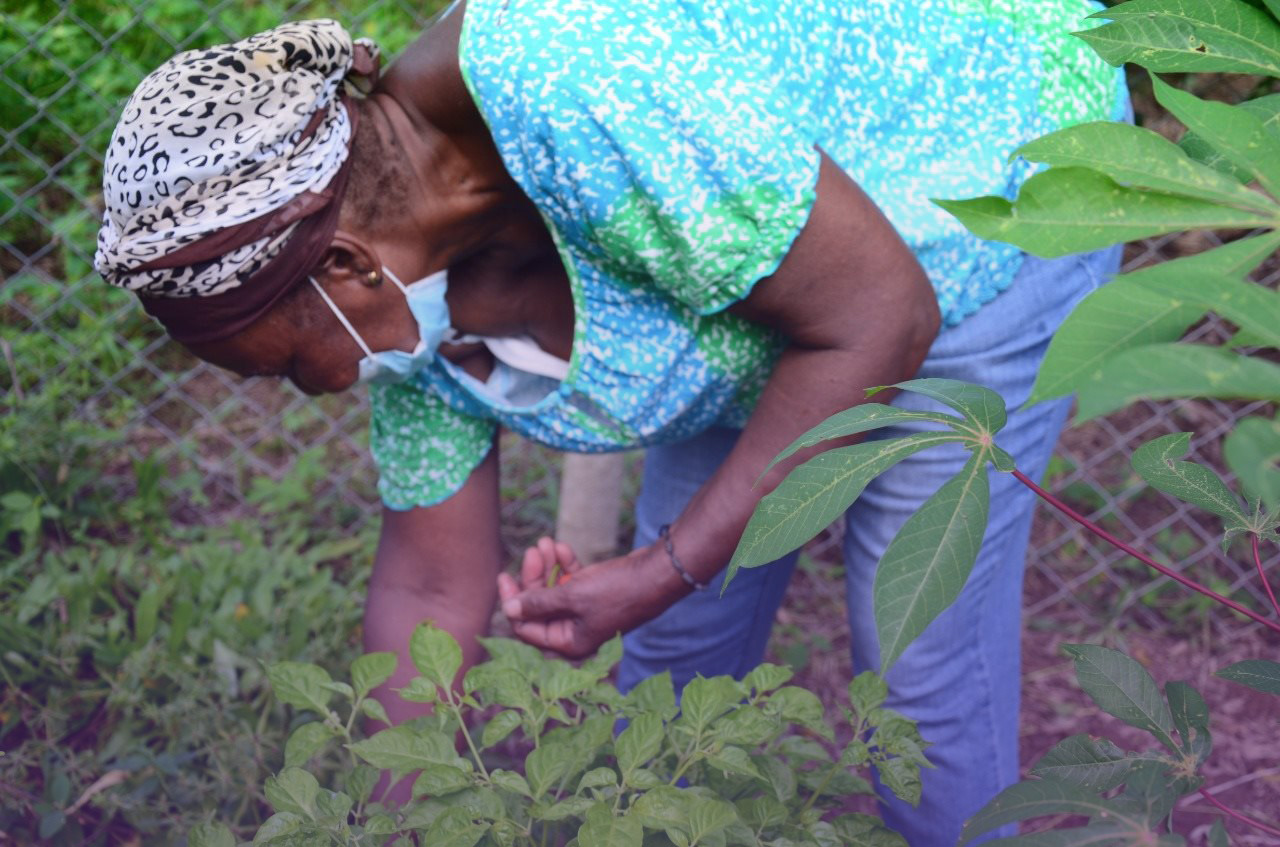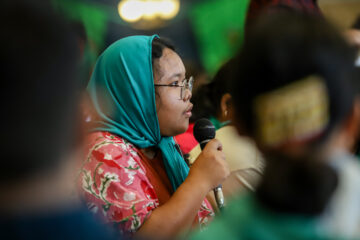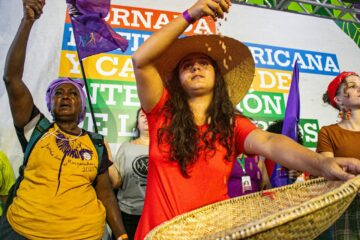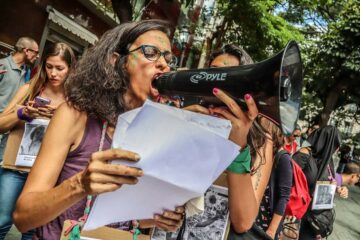Today we celebrate International Afro-Latin American, Afro-Caribbean and Diaspora Women’s Day, a result from the 1st Summit of Afro-Latina and Afro-Caribbean Women, held in the Dominican Republic in 1992. To mark this day, we publish a collective interview with Benita Cordero, Juana Ferrer, and Vanessa Rodríguez, Black peasant activists who are members of the National Confederation of Peasant Women [Confederación Nacional de Mujeres Campesinas – CONAMUCA] in the Dominican Republic. They talk about the current organizing practices and the struggle of Black and peasant women in the country and the Caribbean region.
The CONAMUCA’s activities started in 1981 at the height of the revolutionary movement, the activists tell us. The organization obtained its official status in 1986 and was present in the foundation of the Latin American Coordination of Rural Organizations [Coordinadora Latinoamericana de Organizaciones del Campo – CLOC-La Via Campesina], in Lima, Peru, in 1994. It has since been one of the organizations driving the peasant, feminist, and anti-racist struggle for land reform, food sovereignty, justice, and equality in Latin America and the Caribbean.
Vanessa, Juana, and Benita live in the San Cristóbal province. Vanessa is a member of the Federation of Peasant Women [Federación de Mujeres Campesinas] and of the operational team and the national board of the CONAMUCA’s group of young women. Juana is a member of the CONAMUCA since its foundation, and she is in charge of international affairs at the national board. She is also a member of the women’s articulations with the CLOC and La Via Campesina International. Benita is also a member of the CONAMUCA’s national board and lives in Yaguate, a city in the San Cristóbal province. They shared their experiences and analysis with words, chants, and slogans calling upon all of us: “globalize the struggle, globalize hope” and “with feminism we build socialism.”
It has been almost 30 years since the creation of the International Afro-Latin American, Afro-Caribbean and Diaspora Women’s Day. So we would like to start by listening to how you perceive the challenge posed by the struggle against racism today from the perspective of a feminist and peasant construction.
Juana: We have participated in different efforts for articulating the organization of Black women’s movements in the region for several years. We have developed skills for the struggle that have allowed us to reclaim demonstrations of resistance from the past with new types of struggles: sexual and reproductive rights, health and education, the right to take care and protect natural resources… There are new types of struggles precisely because the levels of discrimination, oppression, and racism are getting deeper. Re-articulating our strength as women has been one of the things that has enabled us to fight against racism and this model itself.
One of the issues feminism has been currently very engaged with in the Dominican Republic is the struggle for the right to abortion. How is this struggle happening and what is your role in it?
Vanessa: As of now, we have talked about decriminalizing abortion in only three circumstances: in case of fetal malformation incompatible with life, when the woman is raped, or when her life is at risk. This struggle has been going on for more than twenty years in the country, but in the last five or seven years it has grown beyond the feminist movement, reaching other sectors. Everyone in the communities now understands this is not just an issue of a group of women, but it rather implicates all the community itself.
Every year, we have an alarming number of teenage girls and women who die in their communities due to clandestine abortions. They are at risk, when going to the hospital, of suffering the same fate as the infamous case of Esperancita, who was virtually kidnapped from the hospital. She could not have an abortion and eventually died. Like Esperancita, there are other women who have gone through the same situation in our country, especially Black and peasant women who lack easy access to private health care. Those who have access to private health care can more easily pay for it or travel abroad to do an abortion.
Sharing this information with citizens in general has encouraged more people and collectives to come together in the struggle for the decriminalization of abortion. We are no longer saying only feminists are mobilizing for it, but also the medical council, progressive voices from churches, and the social movement itself. Since last year, it has been pretty evident that the social movement as a whole has mobilized and taken a stance. The women’s movement is experiencing its best moment yet in terms of support from the media, which keeps the conversation around this subject going in the news. We want members of Congress to know that, when it’s their time to vote, the people will be vigilant. While it remains true that several legislators have voted against the criminal code favoring women, many others have voted in favor of and publicly expressed their support for Dominican women. In the past, even those who supported them would not admit it in public.
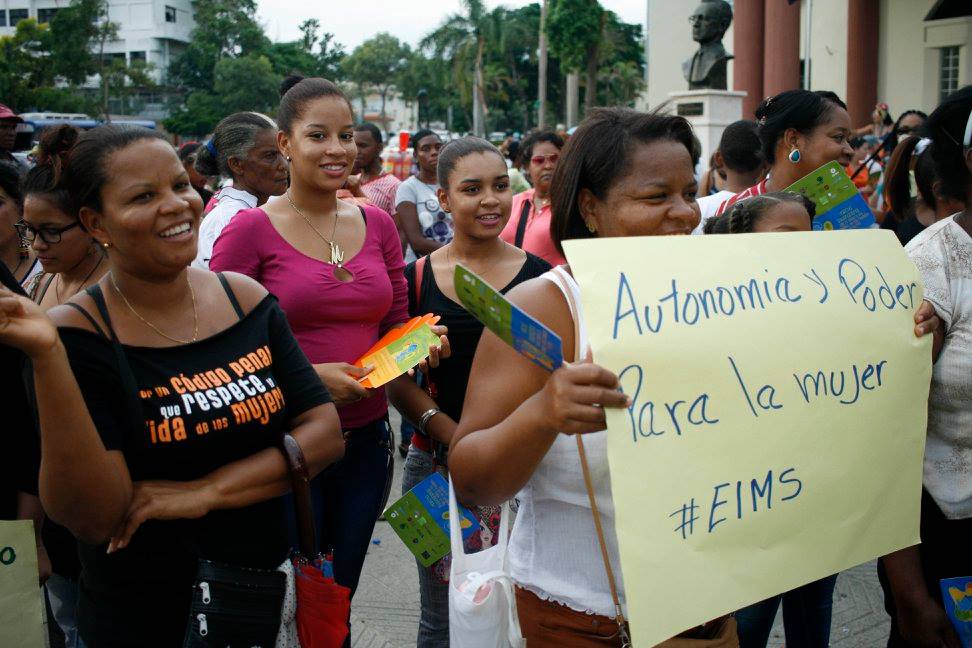
What challenges do you face in the struggle for equality between men and women and against racism in grassroots work in rural areas?
Benita: One of the challenges is to achieve food sovereignty and agroecology. It is also important to emphasize our challenge to engage the youth in the processes of transformation of our territory. Another challenge is to work on a popular peasant feminism from the bases of our organization.
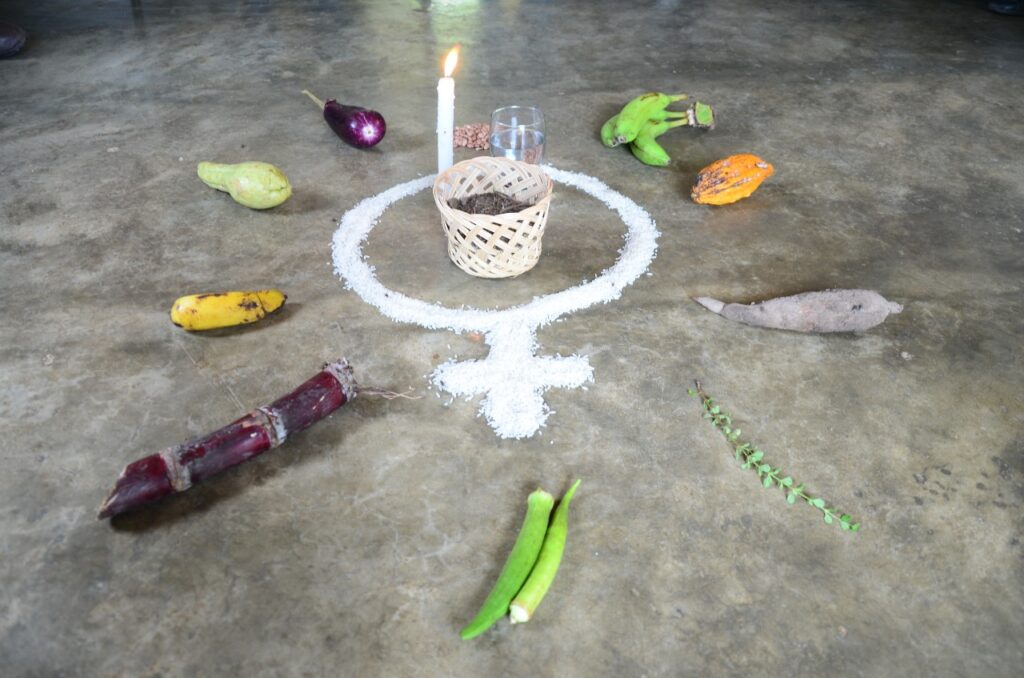
We would like to know more about how you have been driving the process of engaging the youth in political practices. What can we learn by building the movement together with the different generations? To what extent including the youth strengthens the tackling of transnational corporate power and the struggle for food sovereignty?
Vanessa: The CONAMUCA’s objective is to keep a well-organized work of resistance and attention to peasant women and families. This has been accomplished by integrating sisters through an ideological and political education effort. We have contributed with the shared experiences and knowledge we have accumulated over time and the expectations of the society we want to build.
We are part of grassroots organizations in the communities, where we have from elder women to little girls who start to attend our meetings and take part in activities with their mothers. When they grow up, they fall in love with the organization and continue to be a part of it. There is also a middle-sized structure, of federations, where representatives of associations go to, including our young sisters. And there is the national board, which has decided to set in its in its bylaws that it should have 50% of adult women and 50% of young women. So we are 15 young women among 31 sisters. We are not seen as “the future” of the organization, but as part of the whole process of movement building.
Juana: In terms of facing corporate power and the bourgeoisie in the country, our practice is grounded in defending our natural resources. We are acknowledged by the country’s entire social movement for the huge contribution we, as peasant women, make to the struggle to reclaim resources and fight against mega mining projects and against the government and the bourgeoisie’s plans to meddle in food production. We protect seeds from transgenic organisms and agrochemicals.
When we were still considering that the change in government could favor the demands of vulnerable populations (for example, putting a halt to negotiations around our lands and resources), that was encouraging. Now that’s not the case anymore. The entire social and grassroots movement in the country is coming together and organizing to tackle transnational corporations and the bourgeoisie. The CONAMUCA holds an important position in this struggle, because we understand that the only way to face this model is through unity.
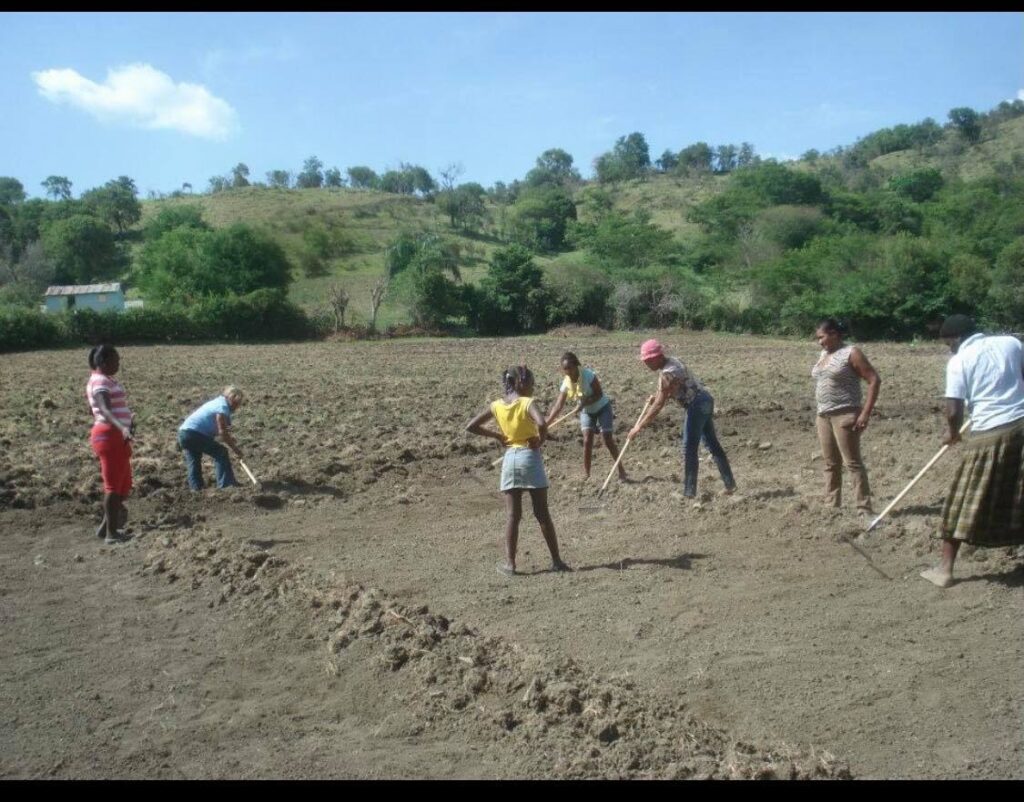
You talked a lot about organizing, conflicts, and resistance. We would also like to ask about practices that you have promoted to build agroecology and defend seeds and territories.
Benita: We now have a political education school for sisters who want to carry out good practices. This has allowed us to bring back conucos[1] and parcelas[2], our ancient practices. Even though peasants practice these things routinely, others claim they are not profitable and that only monoculture crops are profitable… But the conuco is still alive. A good conuco is one where you’ll find bananas, yuca, beans, and much more. The conuco is the only thing that will never fool the man or the woman and will keep no one’s hard work to itself.
Juana: An important practice that collectivism promotes and that we have brought back in agroecological production is the convite [joint effort]. The convite is a way to work the land, both in the process of preparing it and harvesting it, collectively. Instead of one family tending its own conuco by themselves, we do this: we are several families who work on each other’s land together, in solidarity. We are able to reduce the time dedicated to the productive process because more people get involved, but we also bring solidarity back to produce collectively and share. We want to restore this. In the past, a family would grow yuca while another one would grow bananas, and then they would share their produce with each other. This ancient practice is being lost somehow, and in agroecology we are working to bring it back. We see this as an innovative practice that also reduces the pace of migrations, because it motivates people to continue to produce in the countryside.
From what you are saying, these ancient practices that you are bringing back are tools, strategies for the struggle, and a way to build a different future. Is reclaiming heritage an anti-racist practice of the peoples in the Caribbean and the Americas as well?
Juana: Exactly. The conversation around building agroecology through food sovereignty is about this: with unity between the peoples, not only to struggle against the model out on the streets, but also in our own territories, supporting ourselves in food production, caring for the environment, restoring a solidarity-based local market. These are practices that disrupt the individualistic ways that the neoliberal capitalist model subjects us to. Agroecology is an important tool to restore our ways of living and producing. Actually, we have communities in common with migrant comrades and those with Haitian and Dominican heritage, in a way of living that both the Haitian and the Dominican bourgeoisie want to divide. It’s two countries, but it’s the same island.
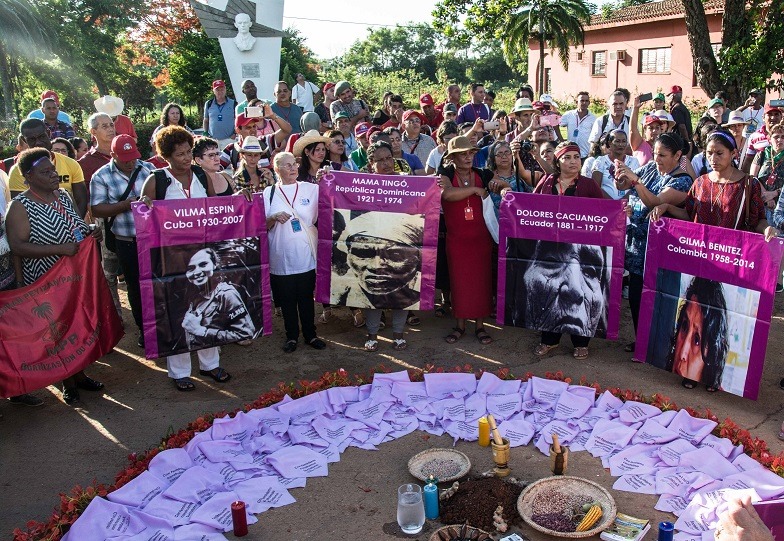
From different parts of the continent, we are watching what is happening in Haiti. It’s important to highlight the solidarity built through the practices you propose. Finally, at Capire, we are looking back at the lives of Black women who are important points of reference for the struggle, and we would like to hear you talk about Mamá Tingó.
Juana: Florinda Soriano, also known as Mamá Tingó, was born in a municipality that used to be in the San Cristóbal province, now Monte Plata province. Since she was young, she supported her family working the land for the Balaguer administration. After 12 years of Balaguer administration, a big landowner who had bought a patch of land through fraudulent means came to her community. That land was Mamá Tingó and her family’s means of livelihood, and she stood up to him as much as she could. She was part of a peasant organization, the Christian Agrarian League [Liga Agraria Cristiana]. Because of the struggle Mamá Tingó was waging, all the peasant movement regarded her as a leader among Dominican peasants. Florinda Soriano was murdered in 1974 by a hit-man. She stood up before being shot with the bullets that put an end to her life.
In 1986, when the CONAMUCA was established, we acknowledged Mamá Tingó as a point of reference, not only for the peasant movement, but also for the feminist movement. In recent years, we have been able to include her as an important historical figure beyond the Dominican Republic, at a continental level. One of the décimas [ten-line stanza] she used to sing is, “to take the land from me they will have to take my life, because the land is my life.”
[1] Conucos are community- or family-based farming practices originally carried out by traditional Indigenous people, based on polyculture especially for own consumption or community trade, while the surplus production may also be traded in local markets.
[2] “Parcelas” are land parcels dedicated to collective organic production. Many sisters and comrades come together in “convites” (joint efforts) to clean, tile, and plow the land, as well as harvest and keep seeds. Additionally, at the CONAMUCA, parcelas are spaces where sisters and comrades can do internships at the agroecology school.

